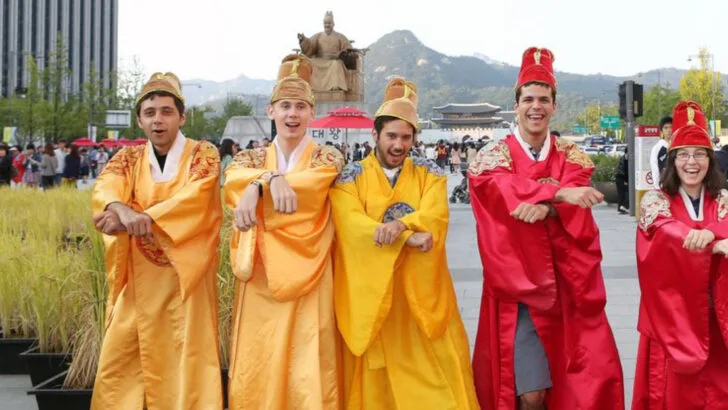South Korea doesn’t ease you in—it sweeps you up. One minute you’re gawking at glowing skyscrapers, the next you’re slurping spicy tteokbokki in a neon-lit alley, wondering why every K-drama failed to prepare you for this. The country is fast, loud, polite, orderly, and a little obsessed with fried chicken—and it’s those hidden cultural curveballs that catch first-timers off guard. Before you pack your passport and perfect your finger heart, there are a few things travelers won’t find in the brochures—but absolutely should know.
You Don’t Need to Tip—and Trying Might Confuse People
Tipping in South Korea is not customary and might lead to awkward situations. Most restaurants and service providers include tips in their prices. Offering extra money can be confusing for locals who are not used to the gesture. In fact, insisting on tipping might even cause discomfort or embarrassment. It’s best to simply pay the amount on the bill and enjoy the excellent service provided. This cultural difference reflects the broader Korean value of inclusivity, where everyone is treated equally, regardless of occupation. Embrace this approach and enjoy your dining experiences without the added complexity of tipping.
Everyone Uses KakaoTalk (And You Should Too)
KakaoTalk is the lifeline of communication in South Korea, far surpassing global favorites like WhatsApp. Whether it’s scheduling meet-ups or sharing photos, KakaoTalk is the app of choice. Its features extend beyond messaging to include games, shopping, and even doctor appointments. Before arriving in South Korea, downloading KakaoTalk is a wise move to stay connected. Dive into local culture by using this app to interact with friends and locals alike. By embracing KakaoTalk, you’ll find yourself seamlessly integrated into daily Korean life.
Street Food Will Ruin You for Life (In a Good Way)
South Korean street food is an experience that will redefine your culinary expectations. The vibrant street markets offer a smorgasbord of tasty delights, from spicy tteokbokki to sweet hotteok. These mouth-watering options are both affordable and addictive, making them a must-try for any visitor. Sampling street food is an adventure in itself, as you navigate through savory aromas and colorful stalls. This culinary exploration provides a glimpse into Korea’s rich food culture, where tradition meets innovation. Indulge in these delicacies and embrace the joy of eating like a local.
The Metro Is Incredibly Clean—and Dead Silent
Riding the metro in South Korea is a study in serenity and cleanliness. The trains glide through the tunnels with barely a whisper, while passengers maintain a respectful silence. It’s a place where phone conversations are discreet and personal chatter is kept to a minimum. The spotless environment reflects South Korea’s commitment to cleanliness and orderliness. As you travel through bustling cities like Seoul, you’ll appreciate the metro’s efficient and soothing atmosphere. This transport system is not just about getting from point A to B, but also about experiencing a slice of Korean courtesy.
There’s Wi-Fi Almost Everywhere (Even Underground)
In South Korea, connectivity is king. You’ll find free Wi-Fi nearly everywhere, from cafes to public parks, and even underground in the subway. The speed and accessibility of internet services are remarkable, negating the need for expensive travel SIM cards. This digital advantage allows for seamless navigation and communication throughout your trip. Staying connected is not just convenient; it enhances your travel experience by keeping you informed and in touch. Embrace the digital ease that South Korea provides and enjoy a hassle-free journey.
Age Matters—A Lot
Age in South Korea is more than just a number; it’s a cornerstone of social interaction. It influences language, etiquette, and even seating arrangements. When meeting someone new, expect age-related questions as a norm. Understanding age hierarchies is crucial for navigating social and professional settings. This cultural nuance reflects a deep respect for elders and tradition. Embrace these customs, and you’ll gain insight into the values that shape Korean society. Age is a lens through which relationships are viewed, emphasizing the importance of respect and understanding.
Bathrooms Might Surprise You
South Korean bathrooms offer a unique blend of the modern and traditional. You may find high-tech toilets with heated seats alongside traditional squat toilets. While these facilities are generally clean, some public restrooms may not provide toilet paper, so carrying your own is advisable. This mix of old and new is a reflection of Korea’s cultural duality, where technology and tradition coexist. Navigating these differences is part of the travel experience, offering insights into everyday Korean life. Embrace the unexpected and make sure you’re prepared for any restroom scenario.
Sharing Food Is the Norm
In South Korea, meals are a communal affair, fostering a sense of togetherness among diners. Dishes are often shared, encouraging interaction and connection. Eating alone, especially in traditional restaurants, might feel unusual, as the culture emphasizes communal dining. This practice extends beyond the food itself, reflecting broader themes of unity and community. Embrace the opportunity to bond over a shared meal and experience Korean hospitality at its finest. Dining in South Korea is not just about satisfying hunger; it’s about creating shared memories.
Nightlife Doesn’t Stop—Until Sunrise
South Korea’s nightlife is legendary, offering an array of options that stretch into the early hours. From karaoke bars to bustling clubs, the night is alive with energy and excitement. Many venues remain open until sunrise, inviting revellers to partake in extended festivities. This vibrant scene is a testament to South Korea’s dynamic culture, where work and play coexist. Whether you’re enjoying a quiet drink or dancing the night away, the night offers endless possibilities. Experience the thrill of South Korea’s nightlife and embrace the freedom to celebrate until dawn.
Trash Disposal Is Complicated (And Strictly Enforced)
Waste management in South Korea is taken seriously, with strict rules governing trash disposal. Recycling is mandatory, and sorting waste into categories is essential. Food waste, in particular, requires careful separation, as improper disposal can lead to fines. This meticulous system reflects a broader commitment to environmental stewardship. Navigating these regulations can be challenging for newcomers, but they highlight the importance of sustainability. Embrace these practices as part of your travel experience, contributing to the preservation of Korea’s natural beauty.
Plastic Surgery Ads Are Everywhere
In South Korea, beauty is big business, and the prevalence of cosmetic surgery ads attests to this cultural phenomenon. From subway stations to shopping malls, these advertisements are impossible to miss. They reflect a societal emphasis on aesthetics and self-improvement. For tourists, the ubiquity of these ads can be surprising, offering insight into Korea’s beauty standards. While it might seem overwhelming, it’s also a reminder of the diverse values that coexist within the country. Observe these trends as a facet of Korean culture that emphasizes individuality and transformation.
English Is Hit or Miss Outside Tourist Zones
While English is commonly spoken in South Korea’s tourist areas, it becomes less prevalent in rural regions. Communication outside major cities can be challenging, requiring patience and adaptability. Translation apps like Papago can be invaluable tools for navigating language barriers. This linguistic diversity highlights Korea’s rich cultural tapestry, where modernity and tradition coexist. Embrace these challenges as part of the adventure, gaining a deeper appreciation for the country’s unique identity. Navigating language differences offers an opportunity to connect with locals on a more personal level.
You’ll Get Stared At—But It’s Usually Curiosity
Foreign tourists in South Korea may experience being the subject of curiosity, especially in areas less frequented by travelers. These stares are typically harmless, driven by genuine interest rather than rudeness. In a predominantly homogeneous society, foreigners are intriguing and novel. This curiosity offers an opportunity for cultural exchange and understanding. Embrace these moments as a chance to share your story and learn from locals. Remember, this fascination is often accompanied by warmth and hospitality, reflecting the kindness inherent in Korean culture.
Nature is Closer Than You Think
Despite its urban appeal, South Korea offers abundant natural retreats. The country is dotted with breathtaking hiking trails, mountains, and coastal escapes just a short journey from bustling cities. This accessibility to nature provides a refreshing contrast to the fast-paced urban life. Exploring these serene landscapes offers tranquility and a deeper connection to Korea’s natural beauty. Whether you’re hiking in the mountains or relaxing by the sea, you’ll find that nature is never far away. Immerse yourself in the peaceful side of Korea and recharge your spirit.

